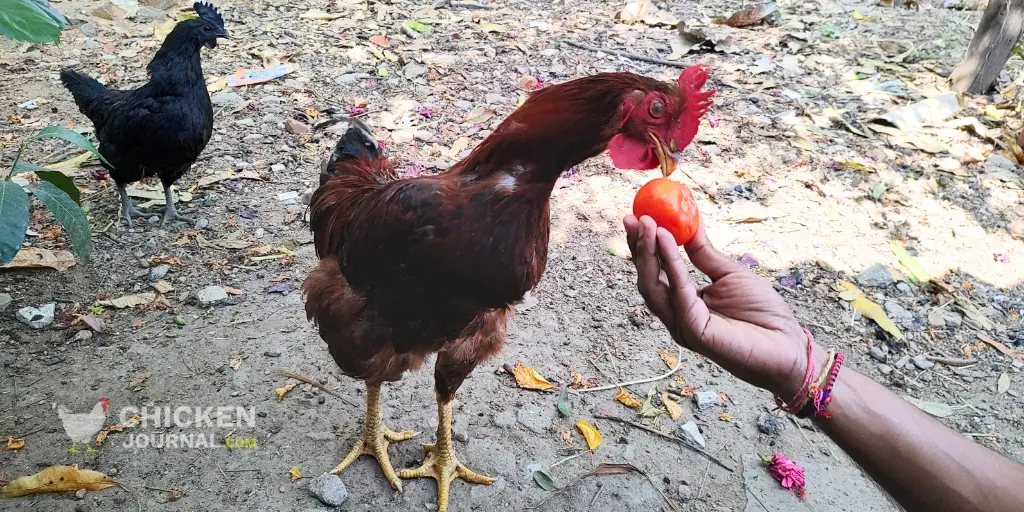
Can chickens eat tomatoes? This is one of the common questions that arises in every newbie chicken keeper’s mind.
Tomatoes are found in almost every country. It’s an easy-to-get and daily-eating vegetable worldwide.
So, chicken farmers are always curious about feeding tomatoes to their chicken flocks.
Chickens are omnivorous and can eat various things in nature, from bugs, seeds, insects, small animals, and plants.
But before feeding, everyone wants to know whether the fruit, vegetable, or animal is safe for their chickens or not.
Tomatoes are rich in vitamins, minerals, and antioxidants, but there are a few safety concerns that every poultry raiser must know.
In this guide, we have explained all about feeding tomatoes to chickens. This includes the nutritional benefits of tomatoes, their benefits to chickens, parts of tomato plants edible for chickens, and common FAQs.
So, before feeding tomatoes to your chickens, go through this definitive guide to keep them safe and healthy.
Also read: List of all chicken treats
The Nutritional Benefits of Tomatoes for Chickens
When you properly feed tomatoes to your chickens with daily feed, they provide various nutritional benefits to them
Ripe tomatoes have a rich nutrient profile, including vitamins, minerals, and antioxidants.
What are those vitamins, minerals, and antioxidants? Let’s find out.
High Water Content: Tomatoes contain high water content, which is helpful for your chicken’s hydration. More than 90% of a tomato is water. So, tomatoes are the best treat during summer if you live in a tropical or subtropical region.
Low in Calories: Tomatoes have a very small amount of calories. So there is no risk of obesity or other health issues. They are different from other treats, which have a high sugar content. Red tomatoes are a fantastic source of low-calorie treats.
Total Lipid: Tomatoes have a very small amount of lipids necessary for energy and absorption of fat-soluble vitamins. So it does not cause any unhealthy weight gain.
Carbohydrates and Fibers: Both carbohydrates and fibers in tomatoes are energy sources for chickens. It also contains a small amount of dietary fiber, which helps digestion and keeps the gut healthy.
Vitamin C: Tomatoes are highly beneficial for chickens as they have a good amount of vitamin C. Vitamin C helps keep the immune system healthy for fighting foreign bodies and infections.
Minerals: Tomatoes also contain potassium, vital for healthy heart and muscle functioning. Magnesium, Calcium, and phosphorus help improve bone health and metabolic functions.
Vitamin A: Tomatoes also contain a small amount of vitamin A, essential for eyes, growth, and reproductive health. The beta-carotene (carotenoids) is converted to vitamin A and helps function in body organs like eyes and the reproductive system in hens.
Vitamin K (Phylloquinone) and Vitamin E (Alpha-tocopherol): These vitamins are available in tomatoes. They enhance the blood clotting time and keep the body cells healthy.
Antioxidants: The most important antioxidant present in tomatoes is Lycopene. It is a highly valuable antioxidant for humans and chickens for better circulation and blood thinning. Both Lutein and Zeaxanthin are important for chickens’ eye health.
Can Chickens Eat Tomatoes?
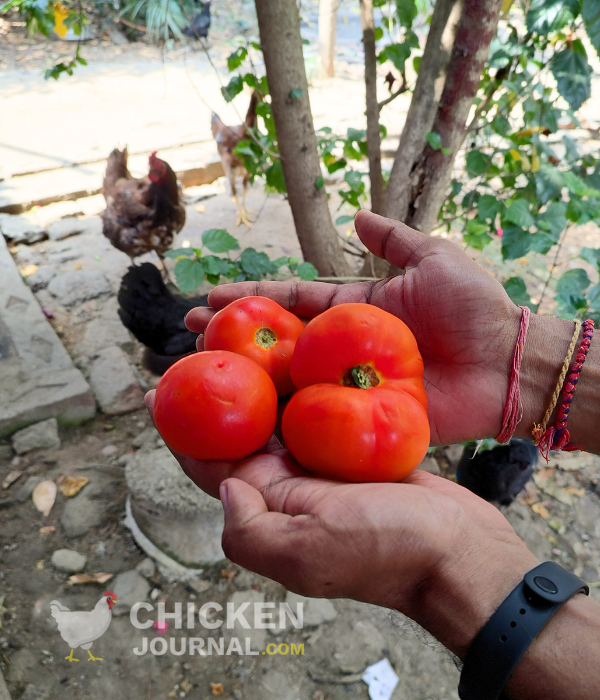
Yes, chickens love to eat tomatoes like the other food. They are healthy, with many essential vitamins and minerals. Also, tomatoes are delicious, juicy, and easy to eat.
All types of tomatoes, such as Cherry, Roma, Better Boy, and Cocktail, are suitable for chickens, but only give them ripe ones.
Tomatoes are one of the contentious foods of the Solanaceae family. It is high in sugar and has more nutrients compared to other fruits.
It is healthy for chickens but with few precautions. You can feed your chicken a couple of tomatoes once or twice a week.
Tomatoes come under the nightshade family, so these types of plants have alkaloids that are harmful to chickens.
These alkaloids, known as solanine, are mostly present in the green parts of chickens, such as leaves, stems, and unripe green tomatoes. It is harmful to chickens; they may cause gastrointestinal problems with lethargy.
We will discuss the side effects and non-feeding parts further in this guide.
Different Forms of Tomato Plants for Feeding Chickens
Can Chickens Eat Raw Tomatoes?
Yes, chickens can eat raw tomatoes, but must be red or ripe. They must be cleaned with clean, fresh water and must not contain any pesticides.
Raw tomatoes are one of the best for tomatoes, which is healthy for chickens. Raw and ripe tomatoes have lots of water content, which helps your chickens live hydrated.
It is an excellent treat in summer. You can give them either by cutting them in two to three pieces or the raw one.
Avoid feeding raw green tomatoes. They contain toxic solanine, which may cause digestive upset in chickens.
Raw tomatoes are healthy, but never replace your chicken’s daily feed. Always follow the 1:10 formula, where the 10% is the treat.
Chicken treats should not exceed 10% of the daily standard diet of chickens; otherwise, they will cause health issues in chickens.
Ripe Vs. Unripe Tomatoes
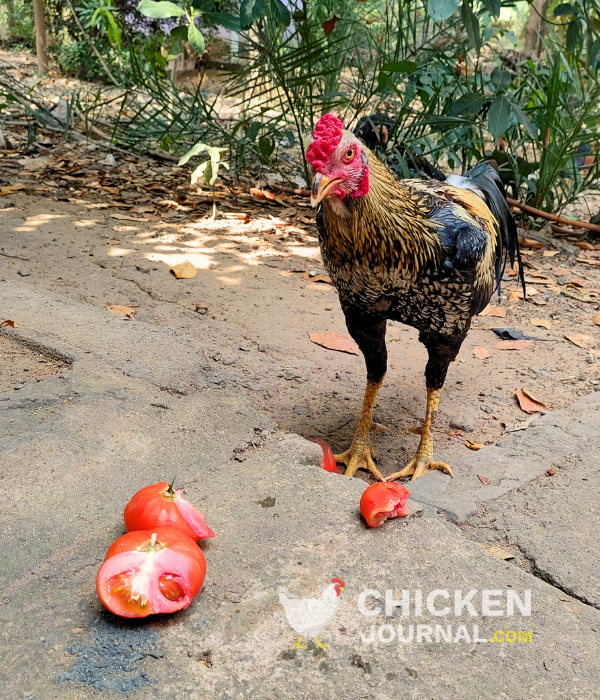
You must understand the confusion between feeding ripe and unripe tomatoes to your chickens.
Both types of tomatoes come from the same plant, but they have different chemical compositions in different stages of development.
Below is a detailed comparison table of Ripe vs Unripe Tomatoes:
| Aspect | Ripe Tomatoes | Unripe Tomatoes |
| Safety | Ripe tomatoes are safe for chickens to eat. | Unripe green tomatoes are not recommended due to their higher solanine content, which can be toxic to your chickens. |
| Nutritional Value | Red ripe tomatoes are high in vitamins A and C, antioxidants (like lycopene), minerals, and water content. They are good for chicken’s health and hydration. | Similar nutritional value is present in green unripe tomatoes but, they have a risk in feeding chickens due to the solanine content in it. |
| Feeding Guidelines | Always make sure tomatoes are fully ripe (deep red, soft) when giving them to chickens. Remove the green parts (stems, leaves) to avoid solanine poisoning. Offer tomatoes as a treat in moderation, not more than 10% of the diet. | Best to avoid feeding to chickens. If eaten accidentally, watch for unknown signs and symptoms. If you see any adverse effects, contact your nearest vet. |
Ripe tomatoes are always a clear winner when you are going to feed chickens. Unripe tomatoes have the same nutrition levels, but they have risks associated with solanine toxicity.
Always feed red and soft tomatoes to your chickens. Avoid feeding green and unripe tomatoes.
If your chickens accidentally eat unripe green tomatoes, keep an eye on their symptoms. Contact your nearest veterinary doctor if they show any bad signs and symptoms.
Cooked Vs. Uncooked Tomatoes
When you are going to feed cooked or uncooked tomatoes to your chickens, you must know which one form is more suitable for your flock.
In which form do the cooked ones have more nutrients, or do the uncooked raw ones have? Both the cooked and uncooked are a part of the chicken’s treat.
Let’s understand using the chart below:
| Aspect | Uncooked (Raw) Tomatoes | Cooked Tomatoes |
| Safety | The uncooked (raw) tomatoes are safe if ripe and free from green parts. | Cooked tomatoes are also safe if cooked plain (no salt, artificial food colors, and spices) |
| Nutritional Value | Uncooked raw tomatoes contain high amounts of vitamins A & C, antioxidants (like lycopene), and water. Good for hydration. | Cooking tomatoes boosts lycopene content, but may lower vitamin C. Beneficial nutrients can depend on the cooking method. |
| Feeding Guidelines | Only feed ripe, red tomatoes. Remove green parts to avoid toxins like solanine. Feed in moderation, under 10% of the diet. | Ensure they’re plain, without harmful spices and seasonings. Give them in moderation, providing a balanced diet. |
Both cooked and uncooked tomatoes are the best treats for chickens. The uncooked (raw) tomatoes must be fully ripe and free from green color parts.
The uncooked ones conserve their nutritional levels like vitamins A and C and antioxidants.
However, the cooked one must be without salt, spices, or artificial colors. After cooking tomatoes, the vitamin content decreases, and only lycopene remains.
Remember whether you give cooked or uncooked feed in the recommended amount.
Can Chickens Eat Tomato Sauce?
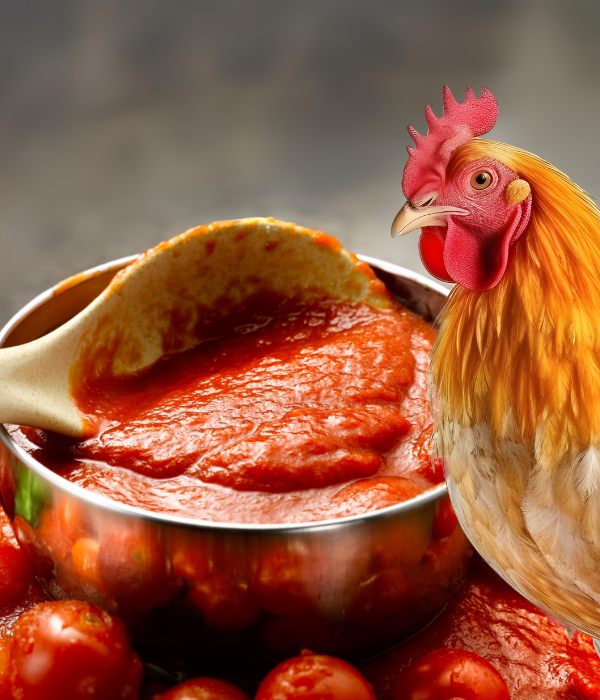
Tomato sauce is not recommended for feeding chickens. If you give tomato sauce to chickens, they will eat it, but it is not good for their health.
Homemade tomato sauce can be given to chickens, but it is a little complicated for chickens to eat it. They scratch on it or make a mess because of its watery form.
Other packed tomato sauces are unhealthy for chickens. Most store-bought tomato sauce contains added salt, sugar, herbs, and spices, such as garlic and onions, which may be toxic to your flock.
Not only this, they contain lots of preservatives and chemicals to extend the shelf life of the product.
Also, the tomato sauce tends to be more acidic than fresh farm tomatoes. High acidic concentrations of tomato sauce may cause digestive issues in chickens.
It may cause nutritional imbalance and diarrhea in chickens if consumed in large quantities.
Can Chickens Eat Canned Tomatoes?
Canned tomatoes are like tomato sauce packing. They also contain chemicals and preservatives to increase shelf life.
Many canned tomatoes contain high salt content, which may cause dehydration, kidney issues, and other health problems.
Acidity regulators are major problem-causing agents that may cause stomach issues in chickens. Chicken can’t tolerate highly acidic components, which leads to discomfort and irritation in the digestive system.
Tomatoes may also contain added sugars and seasoning, including garlic and onions. This may become toxic for chickens, even if taken in small quantities. So, avoid feeding canned tomatoes to chickens.
Can Chickens Eat Cherry Tomatoes?
Yes, your chickens can happily eat cherry tomatoes. Like standard-size tomatoes, cherry tomatoes are also nutritious for chickens.
They also contain healthy vitamins A and C and antioxidants like lycopene. So, without any issue, you can serve cherry tomatoes to your chickens.
Always remember that cherry tomatoes must be ripe; avoid unripe cherry tomatoes, which contain no green part of the plant.
Do not provide very small cherry tomatoes to your chickens because there is a risk of choking for small chickens.
Overall, it’s an amazing treat, like standard medium to large-size tomatoes for chickens.
Can Chickens Eat Tomato Plants?
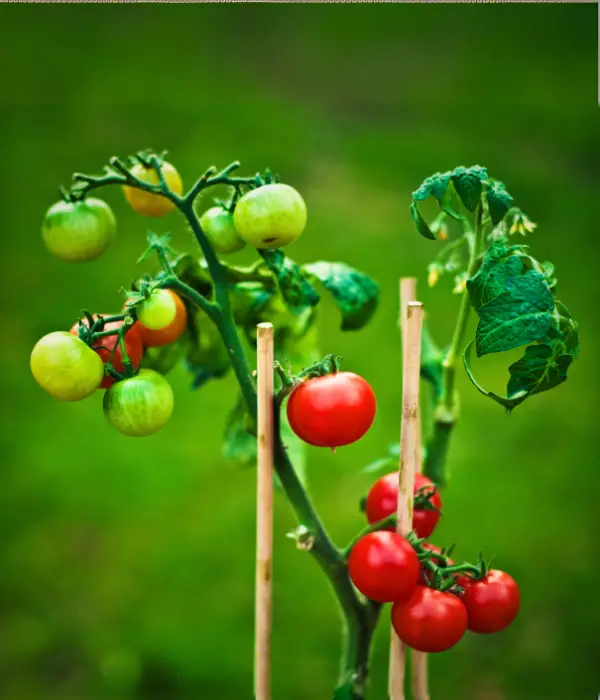
Tomato plants should not be fed to chickens. Chickens can safely and nutritiously consume red tomatoes, but the leaves, stems, and unripe (green) tomatoes contain solanine and other alkaloids that harm chickens.
Solanine, a glycoalkaloid toxin in nightshade plants like tomatoes, can harm poultry. It can cause gastrointestinal distress, weakness, lethargy, and even death. Chickens are sensitive to poisons, and even minute levels of solanine can hurt them.
In addition to solanine, other poisonous alkaloids in tomato plant greens can be toxic to hens.
To ensure safety, only feed poultry the mature fruit of the tomato plant. Keep flocks away from green parts, including leaves, stems, and unripe fruit.
If your chickens enter your garden, keep them away from tomato plants. Fence tomato plants or watch your chickens near the garden.
Tomato Flowers
Chickens can eat tomato flowers, but it is not recommended that they be allowed to do so. Like other tomato plant parts, flowers also come under the nightshade family.
Only ripe tomatoes are best for feeding chickens. Tomato flowers may contain solanine, which is toxic for chickens.
As we have already discussed, solanine is toxic to chickens and may cause severe intestinal problems, inducing weakness.
The few best greens for chickens are lettuce, kale, cucumbers, and squash. These provide nutritional benefits without any side effects.
Tomato Leaves
Chickens shouldn’t consume tomato leaves. The nightshades Solanaceae family includes tomato leaves, stems, and green unripe fruit.
These plant portions contain solanine, a poisonous alkaloid harmful to chickens in large concentrations.
Solanine poisoning can cause gastrointestinal distress, weakness, lethargy, and serious health complications.
Chickens can get more nutrition and enrichment from safe, healthful treats. Toxic-free fruits, vegetables, and grains are safe.
To avoid gastric distress and ensure your chickens are eating their balanced, nutritionally complete poultry feed, introduce new items carefully and in moderation.
Tomato Seeds
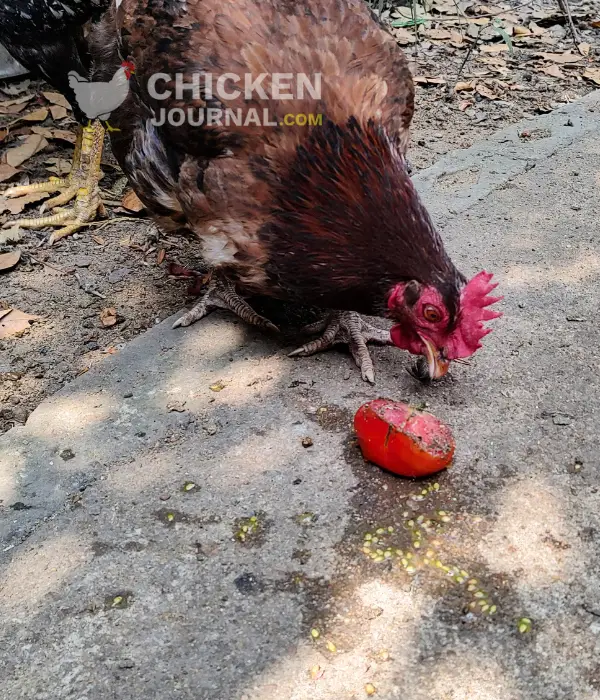
Chickens can safely eat tomato seeds. Ripe tomato seeds do not contain solanine, the poisonous substance found in green tomato leaves, stems, and tomatoes. Thus, flocks can safely eat ripe tomato seeds.
When eaten in moderation, tomato seeds and meat can offer chickens moisture, vitamins, minerals, and antioxidants. Remember these tips when feeding chickens tomatoes and their seeds:
Although tomato seeds are harmless, tomato consumption should be limited. To get balanced nutrition from their basic meal, chickens should not eat more than 10% treats, including tomatoes.
Your birds should only eat ripe, red tomatoes. Solanine in green or partially ripe tomatoes can be hazardous.
Tomato Stems
Chickens shouldn’t eat tomato stems. The tomato plant naturally contains solanine in the stems, leaves, and green unripe sections.
If consumed in large numbers, solanine can become poison for chickens. Solanine toxicity in chickens can cause fatigue, lethargy, gastrointestinal distress, respiratory difficulties, and death.
Because of its low solanine content, mature red tomato fruit is acceptable for feeding chickens.
A balanced poultry feed and a diversified diet of safe vegetables and fruits is essential for chicken health. Rewards like ripe tomatoes should not exceed 10% of a chicken’s diet to maintain nutritional balance.
Avoid Feeding Moldy Tomatoes to Chickens
Chickens should not eat moldy tomatoes because they may cause severe health issues. Moldy food contains various toxins, like mycotoxins, produced by mold fungi.
This rule applies to all types of vegetables and fruits. Whether that is a moldy fruit, vegetable, or bread, all are dangerous for a chicken’s health.
These mycotoxins are toxic materials that are present in food because of mold. Aflatoxins are highly toxic and suppress the immune system, which may lead to the death of flocks.
Mold infections mainly cause respiratory problems when a chicken inhales mold spores. Chickens may show symptoms like breathing difficulties, wheezing, and other respiratory distress.
Sometimes, chickens may have digestive issues when they consume moldy foods. This is caused because the food starts decomposing and creates a suitable environment for harmful microorganisms.
So, do not keep moldy food neat in chicken coops and run areas because chickens can eat anything. They are unaware of mold. Trow moldy food in the dustbin as soon as possible.
How Do You Safely Feed Tomatoes to Your Chickens?
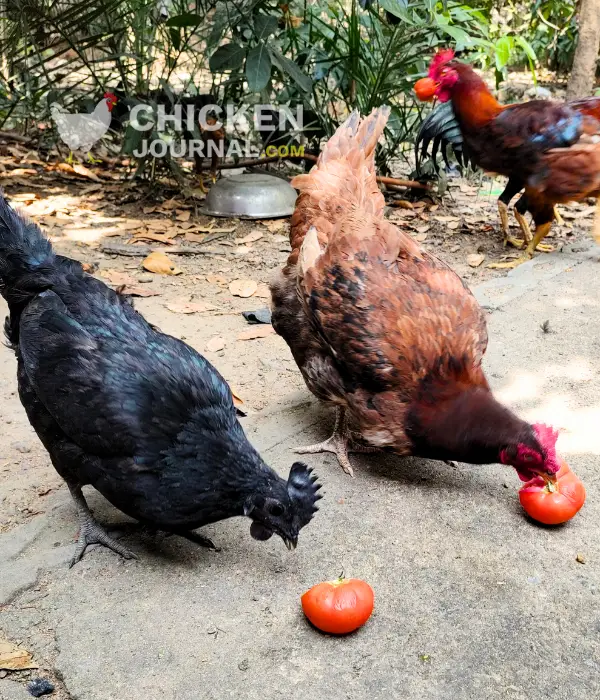
Now you know what type and form of tomatoes your chickens can eat. However, it is important to understand how you can safely feed tomatoes to your chickens.
Below is a step-by-step guide to understanding the right way to feed tomatoes to chickens:
1. Choose Ripe Tomatoes
Firstly, selecting the right tomatoes is most important. Always start with a ripe, red, and soft tomato.
Unripe, green tomatoes contain solanine, which is toxic to chickens. Ripe tomatoes are safe because they do not contain solanine.
Ensure the tomatoes are fresh and free from mold and pesticides.
2. Prepare the Tomatoes
Then, wash the tomatoes with running water. It will remove any dirt, pesticides, chemicals, and pathogens from the outer skin of tomatoes.
Remove any green parts of the tomato, like leaves, stems, and flowers. Depending on the size and age of your chicken breed, you can cut tomatoes into small pieces.
Cutting in small pieces, avoid choking, and easy digestion. When I give tomatoes to my chickens, I cut them in half and keep them in my hand; my chickens love to peck on them.
3. Feed in Moderation
Anything which is not chicken’s daily feed is known as chicken treats. So, tomatoes are also a type of chicken treat.
Tomatoes should not be given more than 10% of your chicken’s overall diet. You must give a balanced diet to your chickens to keep them healthy.
Give tomatoes as an occasional treat to chicken. They are only a part of chickens’ regular feed, but they can’t replace it.
4. Observe Your Flock
After giving every new treat to chickens, it is important to observe your flock. Every treat does not suit every chicken breed and flock.
Observing helps you to notice any side effects. However, ripe red tomatoes have no side effects.
Clean up the uneaten tomato pieces and seeds after a reasonable amount of time. It will prevent pests, avoid molding on the floor, and maintain cleanliness inside the coop and run area.
Common FAQs About Feeding Tomatoes To Chickens
What Age Can Chickens Eat Tomatoes?
Chickens can easily eat tomatoes from a young age, but you must cut them into tiny pieces. I give my chicks tomatoes every one to two days during summer.
I grind them in a mixer and give a little amount. They love to peck and eat grinded tomatoes.
But generally, giving tomatoes to chickens only after 3-4 months of age is recommended. At this age, chickens can easily eat tomatoes without crushing, grinding, or cutting them into small pieces.
Also, after this period, they have almost stopped eating their pre-starter or starter feed.
Can Chickens Eat Tomatoes Every Day?
Ripe tomatoes are safe for chickens as a treat, but not daily. Treats, like tomatoes, should supplement chickens’ balanced poultry feed and not exceed 10% of their diet.
So, avoid giving tomatoes daily to your chickens. If possible, add variety to their treats like cabbage, broccoli, grubs, kale, etc.
Can Chickens Eat Tomato Scraps?
Yes, chickens can eat tomato scraps. Tomato scraps must be clean, fresh, and without mold.
But only if they follow the exact requirements as full tomatoes. Tomato scraps are nutritious and appealing for chickens but must be given safely.
Scraps must not contain any green part of tomato plants because they are toxic for chickens. These parts contain solanine and other toxic alkaloids.
Conclusion (Yes, Chickens Can Eat Tomatoes?)
Chickens can eat tomatoes, but there are safety and health precautions.
Ripe and red tomatoes are healthy and nutritious for chickens, providing vitamins, minerals, and antioxidants like lycopene to boost their health. These nutrients support a robust immune system, strong bones, and proper digestion.
However, green (unripe) tomatoes and all tomato plant parts—leaves, stems, and flowers—contain solanine, which is hazardous to chickens. Avoid solanine toxicity by feeding only ripe tomatoes and avoiding green sections of the tomato plant.
Moderation is crucial when feeding tomatoes to the flock. Cutting tomato scraps into little pieces prevents choking, primarily for small chickens.
Consider giving tomatoes as a treat, not a staple, to prevent nutritional deficiencies and ensure chickens get a balanced diet from high-quality poultry feed.
Due to the difficulties of identifying harmless molds, moldy tomatoes should be avoided. Always provide fresh, nutritious foods to keep chickens healthy.
I hope this guide helped you understand how to feed tomatoes to chickens. What’s your experience?
Share below; we will be happy to read your comments.


Leave a Reply